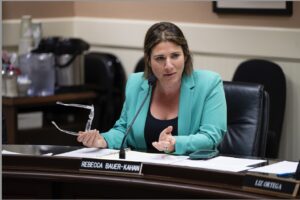California lawmakers have advanced a pair of competing bills that would combat discrimination by artificial intelligence systems, setting the stage for negotiations that could send one or both bills to the governor — or neither.
The measures from Assemblymember Rebecca Bauer-Kahan (D) and Sen. Steve Padilla (D) share the same goal: ensuring automated systems that replace human decision-making are free of bias. They seek to regulate automation in high-risk areas like housing, employment, education and health care, but they take different approaches.
Both bills have been passed by their houses of origin. Only Bauer-Kahan’s has been scheduled for a hearing, on July 1 in the Senate Judiciary Committee. Padilla’s was referred to the Assembly Judiciary Committee, as well as to the Privacy and Consumer Protection Committee, which Bauer-Kahan chairs.
This is Bauer-Kahan’s third attempt at passing an AI anti-discrimination bill. Thad Kousser, a University of California, San Diego political scientist, said it’s not surprising to see her multi-year effort draw an alternative approach.
“This is a rock that someone’s been trying to push up the hill for a while and it keeps falling down on them,” Kousser said. “And so that could invite other legislators into the field of play to try to find something that will generate the consensus needed to become law.”
Bauer-Kahan’s bill would apply to systems “used to make or facilitate a consequential decision.” It would require that developers test automated decision systems before deployment, annually thereafter and following significant modifications. The tests would evaluate systems for accuracy, reliability and disparate treatment based on protected characteristics. Third-party auditors would confirm compliance.
“As our world moves to more consequential decisions in our life being made by AI tools, by algorithmic decision-makers instead of humans, it seems common sense to me that we move to a world where we ensure that those tools don’t discriminate,” Bauer-Kahan said when she announced her bill in February.
Read more: Bauer-Kahan rolls out new AI discrimination bill in Calif.

California Assemblymember Rebecca Bauer-Kahan (D), at an informational hearing on AI in the workforce, on Aug. 7, 2024. (Courtesy of Bauer-Kahan’s Assembly office)
Padilla’s California Artificial Intelligence Bill of Rights is narrower than Bauer-Kahan’s bill and includes an industry-friendly “right to cure” provision, allowing companies in some instances to correct a violation in lieu of penalty.
Both bills would require disclosure to individuals if an AI system is being used to make a decision about them, and the chance for them to appeal.
Padilla cited President Trump’s rollback of a Biden-era executive order on AI when announcing his bill in February.
“California must step in to provide guiderails that create common sense consumer protection while still fostering innovation,” Padilla said at the time.
Concern about algorithmic discrimination by AI systems has been a galvanizing issue for state lawmakers across the country, and quickly caught the attention of the federal government. The U.S. Equal Employment Opportunity Commission held a meeting on the issue in January 2023, during which then-Chair Charlotte Burrows cited estimates that 8 in 10 employers and virtually all Fortune 500 companies were already using AI to screen job applicants.
Colorado lawmakers last year enacted the nation’s first law regulating high-risk systems. Similar bills were introduced in multiple states this year, though none have been enacted amid growing political hesitancy to regulate AI.
Read more: AI regulation faces mounting hurdles
Bauer-Kahan’s bill is supported by a broad coalition of consumer, labor, privacy and civil rights advocates who say “technology should not be a pass to violate our civil and labor rights.”
Several groups, including TechEquity, the Electronic Privacy Information Center and Consumer Reports, sent a letter last month opposing Padilla’s bill unless it’s amended. The letter said the bill as currently written could “inadvertently exempt” many high-risk tools.
While consumer advocates have coalesced behind Bauer-Kahan’s bill over Padilla’s, the tech industry opposes both. In a pair of April letters to lawmakers, CalChamber and other groups said existing anti-discrimination laws already cover AI systems and the bills would have an “undesired chilling effect on the technology.”
Padilla responded to tech pushback in a statement earlier this month, saying “it would be disastrous to allow tech titans to operate AI without oversight, accountability, or restraint.”
Bauer-Kahan said tech companies had resisted “common-sense regulation.”
Bauer-Kahan’s effort to pass an automated decision tools bill began in 2023. After her initial bill failed, she worked with software giants Microsoft and Workday on a new version that both companies initially endorsed last year.
To get the latest version passed this year, Bauer-Kahan is working with consumer, labor and tech accountability groups including the Service Employees International Union California and TechEquity.
Backers point to examples of automated decision bias, including health care and housing loan algorithms that have been shown to discriminate against people of color.
“Everyday people shouldn’t be test subjects for technology, and major decisions in people’s lives should not be the sandbox for AI systems,” Samantha Gordon, TechEquity’s chief program officer, said in a statement to Pluribus News.
Bauer-Kahan and Padilla have less than a month to get their bills voted out of the opposite house policy committees before lawmakers leave for their summer recess. The looming deadline could force a compromise or, alternatively, both bills could die.
Still, California’s privacy agency is writing regulations for automated decision systems, so rules are likely coming regardless of what happens in the legislature.

